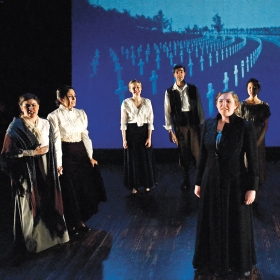Their words both haunt and teach us:
“Before the war, I had two brothers and no money. Now I have more money than I’ve ever had—and no brothers.”
“Every home on the street has a...

Their words both haunt and teach us:
“Before the war, I had two brothers and no money. Now I have more money than I’ve ever had—and no brothers.”
“Every home on the street has a wreath with a black ribbon on its door.”
These are the voices of women—English, German, American—who kept the home fires burning during World War I. With words from century-old letters, diaries, poetry, and songs, they came to life in The Home Front, a production staged this spring by Sarah Barton ’02 and Nora Hussey, director of theatre studies.
“We wanted to tell a number of stories and to bring women into focus,” Hussey says, noting that much of the writing from the period is from men.
A cast of 13—10 students, one alumna, and two male actors—became the farmhands, servants, nurses, and soldiers who endured war’s horrors. They were factory workers who turned yellow from packing TNT into shells. (“You can get the blonde hair you always wanted,” one quipped.) They were mothers in Germany and Britain who wrote one another with promises to care for captured men. (“Truly civilized women never lose their humanity,” they said.)
Barton unearthed primary source material in anthologies and on the internet. “If I was rotten company for most of 2014,” she says, “it was because I was spending a lot of my free time reading about the flu pandemic devastating small towns, or 19-year-olds getting their faces shot off, or little 14-year-olds who’d lied about their ages to join up begging their mothers to find a way to bring them home.” She and Hussey deftly wove the letters, diaries, and official war communications into a narrative punctuated with songs of the era, both rollicking and sad.
As the cast closed the show, singing “Keep the Home Fires Burning,” images of combatants from World War I onward to Afghanistan were projected on the theatre’s back wall—a poignant reminder that the war to end all wars did no such thing.